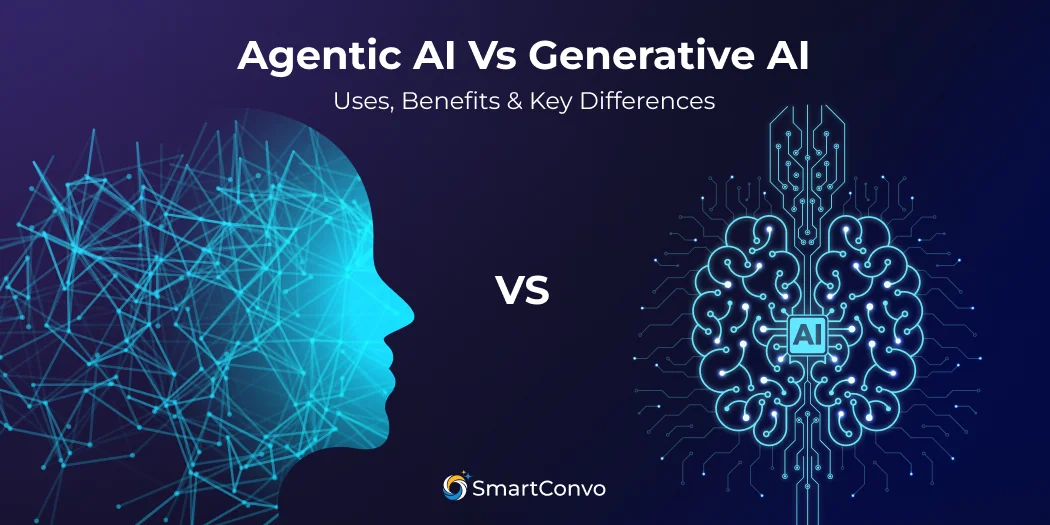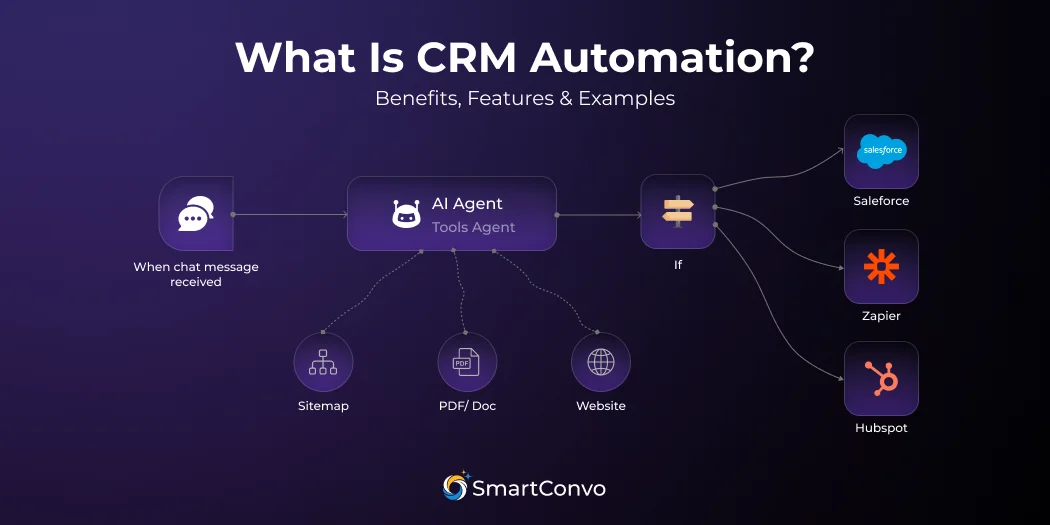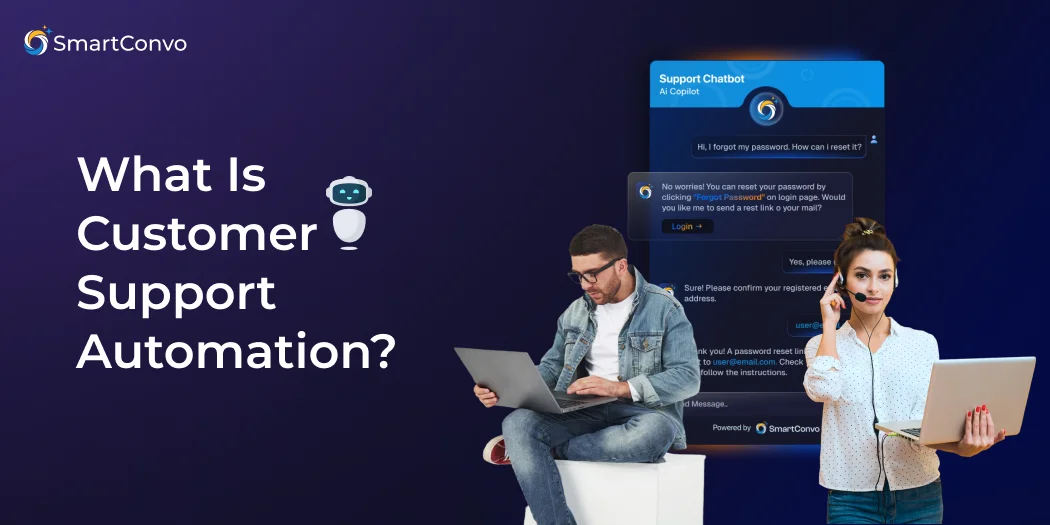Sales is all about relationships, timing, and connections. Building trust with clients, understanding their needs, and delivering the right solutions at the right moment are the foundations of success. But what if there was a way to take some of the repetitive, time-consuming tasks off your plate—without sacrificing quality or that personal touch?
Enter the world of AI sales agents, where cutting-edge technology meets smart strategy to streamline your workflow, handle administrative tasks, and supercharge your sales process. From automating follow-ups to analyzing customer behavior, AI sales tools free you up to focus on what truly matters—closing deals and building stronger relationships.
Whether you’re a sales professional looking for innovative tools, a tech enthusiast curious about how AI works in sales, or a business owner aiming to streamline operations, this guide will cover everything you need to know about how to create an AI agent for sales. You’ll learn what sales AI agents are, how they work, and even actionable steps to build your own AI sales agent. By the end, you’ll have the tools and knowledge to start transforming your sales game with AI.
What Are AI Sales Agents?
AI sales agents, short for artificial intelligence sales agents, are virtual assistants designed to mimic the tasks and actions of human salespeople. Imagine a digital salesperson that can engage with leads, answer questions, send follow-up emails, and even schedule meetings—all while generating insights to improve your sales strategy.
Sales AI agents use advanced technologies such as Generative AI Integration and LLM-Based Chatbots to provide dynamic, personalized solutions that adapt to individual customer needs in real-time. These AI-powered tools are capable of handling a wide range of tasks, from lead qualification and customer follow-ups to nurturing prospects through the sales funnel and even closing smaller deals independently.
By leveraging natural language processing and machine learning, sales with AI agents can analyze customer behavior, predict needs, and deliver tailored interactions that improve conversion rates and overall customer experience.
Types of AI Sales Agents
Not all AI agents in sales are created equal, and their effectiveness can vary based on your specific business needs and goals. When exploring options, you might come across different types of sales AI agents, each designed to address unique challenges and streamline parts of your sales process.
1. Sales Assistant Chatbots
These AI-driven helpers handle direct conversations with customers, offering businesses an efficient way to manage communication. They rely on conversational AI, a technology that uses natural language processing to understand and respond to queries in a human-like manner. This allows them to answer questions, qualify leads, resolve issues, and provide immediate assistance at any time of day. Their advanced natural language abilities.
2. Lead Qualification Agents
These AI agents specialize in filtering and prioritizing leads by analyzing a variety of data, including user behavior, demographics, and engagement history. By leveraging this information, they identify the most promising prospects, ensuring that your sales reps can focus their time and efforts on high-value opportunities. This not only boosts efficiency but also increases the chances of closing deals and driving revenue growth for your business.
3. Knowledge-Driven AI Agents
By leveraging structured knowledge in AI, these agents provide actionable insights about customers, competitors, and market trends. They can analyze vast amounts of data to uncover patterns, predict customer behavior, and highlight emerging opportunities. Additionally, they recommend tailored strategies to help your business stay ahead of the curve.
4. Sales Copilots
Sales copilots serve as invaluable assistants, streamlining tasks like data entry, follow-ups, and reporting for sales professionals. They combine the efficiency of AI automation with the reliability of human support, creating the perfect partnership to simplify your workflow.
Real-Life Examples of AI Sales Agents in Action
- Salesforce Einstein: Salesforce leverages Enterprise AI to provide predictive sales analytics, enabling businesses to forecast future sales trends with greater accuracy. It also automates follow-ups, ensuring no lead falls through the cracks. By identifying high-value prospects and streamlining workflows, Salesforce helps sales teams focus their efforts on prioritizing the best leads, improving efficiency and driving better results.
- HubSpot CRM AI Assistant: This AI copilot streamlines your workflows, drafts personalized and automated outreach emails, and delivers real-time sales insights to help you make data-driven decisions. It’s designed to save time, boost productivity, and enhance your sales performance.
- Drift’s Conversational AI: Drift’s platform uses an advanced customer AI sales agent powered by conversational AI to engage with site visitors in real-time, answering questions, providing personalized recommendations, and guiding them through the customer journey. By creating meaningful interactions, it seamlessly converts leads into loyal customers, saving time and boosting sales efforts.
Key Features of an Effective AI Sales Agent
Before rolling up your sleeves and building one, you’ll want to ensure your sales AI agent solutions include the following key features to operate effectively and drive results. These features are essential for maximizing efficiency.
- Personalization: The ability to tailor interactions using data insights allows businesses to create personalized experiences by analyzing customer behavior, preferences, and needs to deliver more relevant and engaging communications.
- Scalability: Adapt to increased customer demands seamlessly while maintaining high levels of efficiency and ensuring consistent quality in your services.
- Integration-Friendly: Easily integrates with your existing CRM tools or marketing platforms, ensuring a smooth transition and enhancing your current workflows without any disruptions.
- Real-Time Learning: Uses advanced machine learning algorithms to become smarter and more efficient with every interaction, continuously improving its performance and delivering better results over time.
- Accuracy: Delivers consistent, factual, and high-quality responses every time, ensuring reliability and accuracy for all your queries or tasks.
How Do AI Agents Work?
At the heart of an AI Agent for Sales are complex systems like neural networks and LLM chatbot models, which are designed to process and analyze large amounts of data with precision. These agents rely on customer data, such as past purchase behavior, browsing history, and preferences, to make informed decisions.
By leveraging this information, they craft personalized responses that resonate with customers or recommend products and services that align perfectly with a buyer’s specific needs. This combination of advanced technology and data-driven insights helps businesses enhance customer engagement, improve sales efficiency, and deliver a more tailored buying experience.
Here’s a simplified explanation of the process:
- Data Input: The customer provides their information or submits a question, either through a form, chatbot, or live support, initiating the process for assistance or further action.
- Processing: AI analyzes the input by leveraging real-time data combined with advanced machine learning algorithms to identify patterns, predict outcomes, and provide accurate, data-driven insights for better decision-making.
- Action: The AI offers a tailored solution, product recommendation, or actionable step, such as scheduling a follow-up call to ensure seamless communication and address customer needs more effectively. It streamlines processes, saving time while enhancing overall efficiency.
How to Build an AI Agent for Sales

Creating a sales AI agent might sound technical, but breaking it into manageable steps simplifies the process. Here’s how you can do it:
1. Define Your Goals
Identify the specific problem you want your AI agent to address. Are you looking to boost lead conversions by engaging prospects more effectively, or do you want to provide faster, more efficient responses to customer queries to improve satisfaction? Clearly defining your goals is a crucial first step, as it ensures the AI solution is tailored to align perfectly with your business needs and delivers measurable results.
2. Gather Your Data
AI agents need data to work effectively, as data forms the foundation of their learning and decision-making capabilities. To get started, begin by gathering historical data such as customer interactions, sales records, support tickets, and FAQs. This data provides the context and patterns the AI agent needs to perform well. It’s crucial to ensure that the data is clean, well-labeled, and properly organized to avoid errors or biases during the training process.
3. Choose the Right AI Platform
Select an AI platform capable of supporting your goals. Some popular platforms include:
- OpenAI for advanced conversational agents that can understand context, provide accurate responses, and enhance user interactions.
- Dialogflow Developed by Google for creating custom chatbots and virtual assistants, designed to enhance user interactions and automate tasks efficiently.
- Microsoft Azure AI for scalable enterprise needs, providing flexible solutions that grow with your business.
4. Train the AI Agent
Train your AI agent to understand various types of inputs, provide meaningful and contextually relevant responses, and make accurate predictions based on data. This process is accomplished using machine learning techniques, such as supervised learning, where the AI is trained on labeled datasets to identify patterns and make informed decisions. Over time, as the AI processes more data and feedback, it becomes increasingly smarter, more efficient, and better equipped to handle complex tasks, ultimately improving its overall performance and usefulness.
5. Enable Integrations
Connect your AI agent with powerful tools like Salesforce, HubSpot, or other CRM platforms to streamline and optimize your sales process. By integrating with CRM and email platforms, your agent can seamlessly access and update customer data, track interactions, and automate follow-ups, ensuring smooth and consistent communication.
6. Test & Optimize
Before launching your AI agent, take the time to thoroughly test it to ensure a seamless user experience, accurate responses, and proper handling of unusual or unexpected scenarios. This involves running the AI through a variety of simulated interactions to identify any potential issues or gaps in functionality. Collecting user feedback during beta testing is also crucial, as it provides valuable insights into real-world use cases and highlights areas for improvement.
7. Deploy and Monitor
Deploy your AI Copilot across your preferred channels, whether it’s your website, app, or social media platforms, once it’s fully optimized to meet your business needs. Monitor its performance closely using key metrics such as conversion rates, response time, and customer satisfaction. These insights will help you evaluate how effectively your AI Copilot is engaging with users, resolving issues, and driving results.
Challenges of Implementing AI in Sales
While AI has the potential to revolutionize your sales process, it’s not without its challenges. Common barriers to successful implementation include:
- Lack of quality data for accurate AI training: AI systems rely on clean, comprehensive, and relevant data to operate effectively. Without it, predictions and insights may be flawed, leading to poor outcomes.
- High initial costs for development and integration: Implementing AI requires significant financial investment upfront, including purchasing software, integrating it into existing systems, and customizing it to meet your specific needs.
- Resistance from sales teams worried about job displacement: Many sales professionals may fear that AI will replace their roles, leading to hesitation or lack of engagement with the technology.
Overcoming these challenges requires a clear, well-thought-out strategy that emphasizes the value AI brings to your team. Securing stakeholder buy-in is crucial to ensure alignment and support throughout the process. Additionally, ongoing training programs are essential to help your staff understand how AI complements their roles, enabling them to use the technology effectively and confidently.
Future Trends in AI-Powered Sales Agents
The future of AI agents for sales is incredibly promising, with advancements revolutionizing how businesses connect with customers. Here are some emerging trends to watch:
- AI-Powered Virtual Closers capable of handling complex negotiations. These virtual agents can analyze customer data and preferences in real-time, enabling them to craft personalized solutions and close deals more effectively.
- Advanced social media sales AI agents that go beyond basic interactions by analyzing non-verbal cues such as emojis, tone, and engagement patterns. This allows businesses to better understand customer sentiment and tailor their outreach.
- AI sales tools with enhanced LLM chatbot functionalities, enabling more automated yet nuanced conversations. An AI sales chatbot can generate human-like responses, manage detailed queries, and adapt to varied customer behaviors, making it invaluable for improving customer experience and driving sales.
No Credit Card Required | 14 days Free Trial
Build Your Chatbot
Conclusion
Building an AI agent for sales may seem like a tech-heavy project, but the rewards it can bring to your business are unparalleled. These agents can handle repetitive tasks, streamline your sales processes, and provide personalized client interactions at scale, giving your team more time to focus on high-value activities. A well-designed Sales Chatbot can analyze data, predict customer behavior, and even suggest actionable insights, helping you close deals faster and more effectively.
To get started, take it one step at a time define clear goals for your AI implementation, gather and organize relevant data, and choose the tools and platforms that best fit your business needs. Collaborating with your sales team during this process ensures the AI aligns with their workflows. Need more guidance? Dive into how industry leaders are leveraging AI automation to transform their sales strategies and redefine the way businesses connect with customers. The future of smarter, more efficient selling starts here!
Frequently Asked Questions (FAQ)
An AI sales agent is more advanced, using natural language processing and machine learning to engage dynamically, while ai chatbot follows predefined scripts.
Basic AI sales agents can start at $5,000, while enterprise-level implementations might climb to $100,000 or more, depending on complexity.
No, They complement human teams by taking over repetitive tasks, freeing employees to focus on building relationships and closing deals.
Industries like retail, SaaS, telecommunications, and finance are seeing the most benefits, as they heavily rely on efficient customer interactions.
Track key metrics like lead conversion rates, average response times, and customer satisfaction scores to evaluate effectiveness.













